Classic Commentaries and Studies on Amos (5 vols.)
Digital Logos Edition
Overview
Classic Commentaries and Studies on Amos offers some of the most significant classic studies on the book of Amos from the seventeenth, eighteenth, and nineteenth centuries. With notable authors such as Scottish theologian John Edgar McFadyen and Old Testament scholar H.G. Mitchell, this collection offers over 1,000 pages of interpretation, observations, translations, contextual history, and practical application. These five volumes have had an enduring impact on Old Testament exegesis, and this exceptional collection provides easy accessibility to this wealth of diverse and significant scholarship.
In the Logos edition, the Classic Commentaries and Studies on Amos is enhanced by amazing functionality. Scripture citations link directly to English translations, and important terms link to dictionaries, encyclopedias, and a wealth of other resources in your digital library. Perform powerful searches to find exactly what you’re looking for. Take the discussion with you using tablet and mobile apps. With Logos Bible Software, the most efficient and comprehensive research tools are in one place, so you get the most out of your study.
Key Features
- Gathers five significant texts in the history of scholarship on Amos
- Provides resources ranging from Reformed Bible commentary to historical critical study
- Includes over 1,000 pages of time-tested scholarship on the book of Amos
Product Details
- Title: Classic Commentaries and Studies on Amos
- Volumes: 5
- Pages: 1,060
- Resource Type: Commentaries
- Topic: Biblical Studies
Individual Titles
- A Commentarie or Exposition upon the Second Chapter of the Prophecie of Amos by Sebastian Benfield
- A Sermon Preach’d before the Honourable House of Commons on Amos 4:10 by Andrew Snape
- Lectures in Exposition of the Book of the Prophet Amos by Vincent William Ryan
- Amos: An Essay in Exegesis by Hinckley Gilbert Thomas Mitchell
- A Cry for Justice: A Study in Amos by John Edgar McFadyen
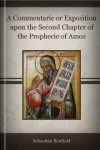
These 21 sermons from seventeenth-century Oxford scholar Sebastian Benfield dig deeply into the second chapter of Amos and God’s judgment on Israel and Judah. Benfield’s scholarly sermons also provide timeless application of the Bible and reflect the burgeoning modern philosophy of the seventeenth century.
Sebastian Benfield (1559–1630) was Lady Margaret Professor of Divinity at Oxford and rector of Meysey Hampton, England.
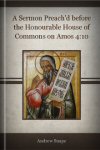
Andrew Snape’s sermon on Amos 4:10 was preached before the House of Commons in 1711, during the first years of the United Kingdom, on the occasion of a general fast. Snape eloquently reflects on the judgment visited on Israel and encourages the British nation in the face of war and other trials. This brief volume will fascinate historians and help minister during times of widespread suffering.
Andrew Snape (1675–1742) was provost of King’s College, Cambridge. Snape was removed from the list of the king’s chaplains during the Bangorian controversy, writing against Benjamin Hoadly.
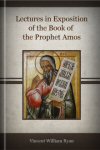
Vincent Ryan preached these 24 sermons on Amos were preached during his time at St. Mary’s in Edge-Hill during the early years of his ministry. The young preacher works through the entire book of Amos, verse by verse. Ryan’s text is full of pastoral warmth and keen insight into the prophetic literature of Amos.
Vincent William Ryan (1816–1888) was the first bishop of Mauritius. He attended Magdalen College, Oxford, and was ordained in 1842. After his tenure as bishop, he served in parish ministry in Bournemouth, Middleham, and Stanhope.
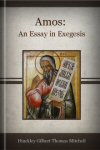
This critical examination of Amos from prestigious Old Testament scholar H.G. Thomas covers a range of issues in interpreting prophetic literature. Mitchell includes introductory studies on Amos the historical person, the date of his writing, and the composition of the biblical book. The bulk of Thomas’ study is a critical commentary on his translation of Amos. Mitchell also includes studies on Amos’ place in the Bible and alongside other prophetic literature in the Bible.
Hinckley Gilbert Thomas Mitchell (1846–1920) was a Methodist minister and professor of Old Testament at Boston University for 25 years. Mitchell was one of the leading Old Testament scholars of his day, was director of the American School in Jerusalem, and was a noted higher critic.
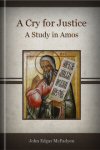
In this work, Reformed scholar John Edgar McFadyen presents nine engaging theological studies on Amos, covering the theme of each chapter. McFadyen’s text is a fascinating resource for studying Old Testament religious systems and seeing the themes of justice, law, and redemption in the whole biblical narrative.
John Edgar McFadyen (1870–1933) was a Scottish theologian, linguist, and professor of literature and theology at the University of Glasgow. He also translated several Old Testament books into “modern speech” and was a proponent of the international auxiliary language, Esperanto.

This title is included in the following collections
You can save when you purchase this product as part of a collection.
Logos 8 Collector's Edition Le...
$11,399.99$11,399.99Logos 9 Collector's Edition Le...
$11,399.99$11,399.99Logos 8 Ultimate Legacy Librar...
$21,749.99$21,749.99Logos 9 Ultimate Legacy Librar...
$24,999.99$24,999.99